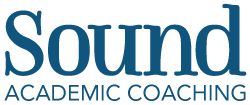02 May Help for disorganized kids: tips from an executive functioning coach
Written by Karen Pavlidis, Ph.D. from her website, childandteensolutions.com
April 13, 2023
“My child needs help with executive functioning.”
Executive functioning has become a buzz phrase that we often hear from parents. But what is executive functioning and how do we help young people who are struggling in this area?
I decided to ask my colleague, Beth Peterson, executive functioning coach and owner of Sound Academic Coaching, about strategies that work.
What is the #1 executive functioning related concern that your team encounters?
Most concerns involve a disconnect between a child or teen’s abilities and their performance or life management. Organization and time management are usually the primary focus.
Most of the students we work with feel swamped. Many have ADHD or autism as well as anxiety and sometimes depression. We aim to empower students to feel a sense of control over their schedules, and this can help to reduce their anxiety.
How do you empower students in this way?
We try to find strategies that will work for a given student, whether it’s a planner, an app, or some other tool. Some students just need guidance to see the big picture of their obligations. We have a collaborative model, so we don’t say – “you should do this” – instead, we talk about various strategies and the student chooses for themselves. We support students in building self-agency as well as meta-cognitive skills.
What are meta-cognitive skills and why are they important?
We talk about “understanding your thinking, or why you think about things in the way that you do.” It’s really impressive when a young person has high meta-cognitive strategies, where the student has an accurate view about where they struggle and where they have strengths. For students who come in lacking these meta-cognitive awareness, we can help to build these skills.
How do you help anxious students to combat avoidance?
I’ve always felt if we can get to the root of procrastination, we can help. Avoidance could be a reflection of feeling confused about what to do, seeing a task as boring, a fear of failure, or perfectionism – to name just a few of the possible causes.
One of the strategies that can help is to put on “future glasses” and create a timeline. We have a collection of short videos with tips for students. One of them is about the “two minute rule,” where you tell yourself to do a dreaded task for just two minutes. This usually works well to help the student get started on tough assignments such as essays.
In our conversations, you‘ve mentioned time blindness. What is that?
Some students don’t seem to understand the passing of time. The student may lack a sense of what five minutes looks like, or whether something happened an hour ago, yesterday, or last week. Some students don’t have a sense of whether an assignment will take 5 minutes versus an hour. It also comes up when students need to plan backwards for how to get somewhere on time. We consider developmental research on how far out students at various ages can look ahead in time – it’s surprisingly short, even for high school students. Students often say, “I’ll do it later” – we like to point out that “later” isn’t a time. We assist the student in identifying a specific time to complete a task.
Digital clocks can be difficult for these students. It can help to visualize hands on a clock moving. Time awareness is a skill that can be built.
What child or teen characteristics are good predictors for responding well to direct coaching (vs. focusing more on strategies that parents can use)?
Students who are willing to actually try the strategies that we offer benefit the most. We want the student to know that when they work with a coach, they will become more efficient with their time. We explain that if you are willing to try this for a few weeks, you’ll probably find that you get more done and have more time for fun. Once a student is on board with this concept, they are likely to benefit.
What ages do you work with?
Most of the students we work with are in high school. Recently, we’ve been getting more calls for 5th and 6th graders. Most children in middle and high school prefer to work directly with the coach.. For younger kids (elementary school), the work will be more parent heavy and focused on building systems and routines to help at home and school. Sometimes parents of kids that we coach ask for coaching for themselves. We also work with a lot of college and graduate students.
What are the top three strategies that you find yourself returning to again and again?
The one that I go to most often is to create a visual for what the student needs to do. I talk about a way to “get it out of your head and onto something.” We talk about how the brain has limited real estate, so any way to free up space is productive. There are a thousand strategies that fall under this category.
A second common focus is time management and ways to make time real. There are a lot of apps and methods that we suggest, where we customize the method to what the student needs.
We also do daily check-ins that we refer to as “accountability” check-ins. Most productivity specialists will agree that accountability is a key strategy.



